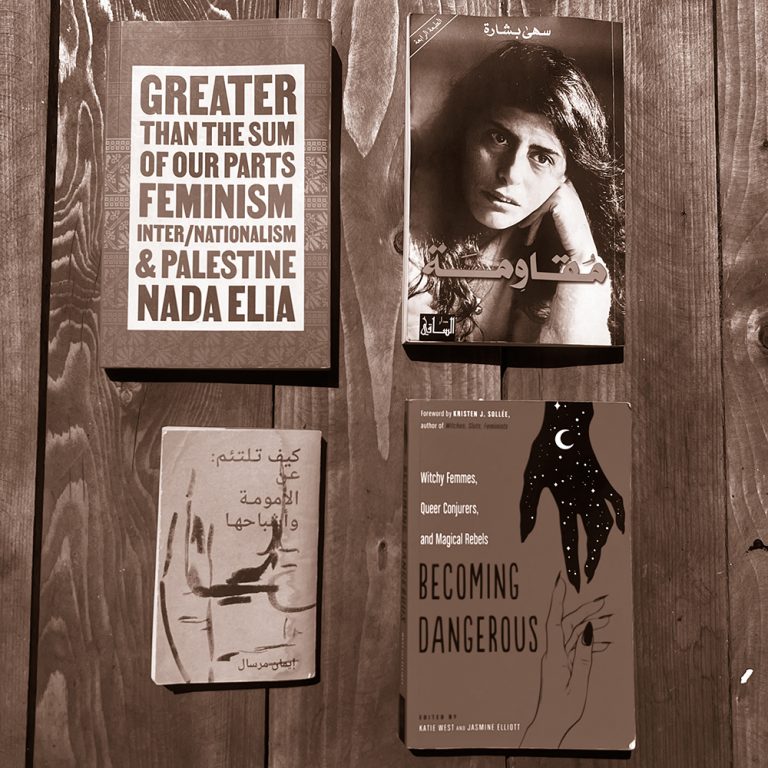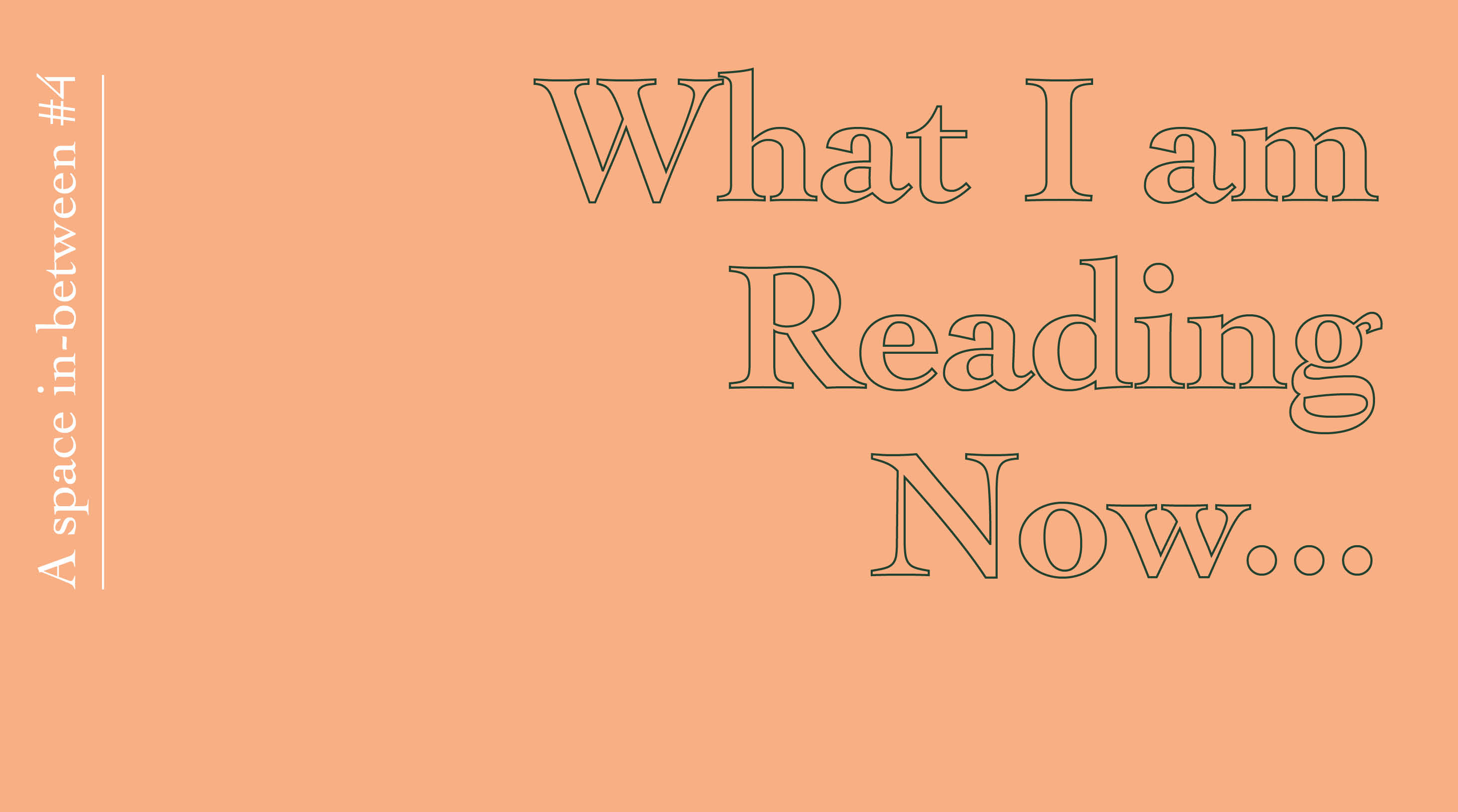What I am Reading Now…
Yasmine El Rifaii
July 2024
My reading pattern is often interrupted. When I reach the middle of a book, I start another, and read them in parallel. If you translate this behaviour into numbers, the equation would lead to an infinity of unfinished second halves. Before I started writing this text, I piled my current readings atop each other, trying to evoke a connection between them. One cover is red, two are orange, and the fourth is pink. The same warm color palette, a huge discovery. I placed them on my bedroom’s windowsill only to wake up the next day to a leaking window, my books were soaked: a sign to stop piling them and to finish reading them instead.
In 2021, I had the honour to publish an interview with Soha Bechara in Al Hayya Magazine. Soha is a freedom fighter, and one of the many faces of the liberation of the South of Lebanon. Soha attempted to assassinate the head of the Lahad army, a faction of the Lebanese far right armed militia which cooperated with the israeli Occupation of Southern Lebanon from 1982 till 2000. She wrote her autobiography titled “مقاومة”, English title, Resistance: My Life for Lebanon, where she humbly tells the story of her life, how her village and then Lebanon were occupied, how she crafted a plan to reach the commander heading the armed militia, gained his confidence, shot him into paralysis. She was then taken to Khiam where she spent 10 years, 6 of which were in solitary confinement (Khiam was a notorious detention centre ran by the Occupation-backed Lebanese Christian militia, also known as the South Lebanon Army, during the occupation of the south). As you read, you feel so close to Soha, her language is as simple and clear as her convictions. I started reading the book before we launched the magazine. A colleague who didn’t know much about Soha wanted to read it, so I lent it to her before I finished it. She ended up taking the book with her abroad for three years. In November 2023, one month into the genocidal war on Gaza, the book was returned to me. I am thankful that I got to finish it in this time.
One of the orange books I’m reading is written by Nada Elia titled Greater than the Sum of Our parts: Feminism, Inter/Nationalism and Palestine. This book was very important for me in understanding more precisely the ties between Queer liberation, and Land liberation. Nada carves a space for the imaginary and succeeds in elucidating the commonalities between two sentiments: queer/feminist liberation, and Palestinian liberation. From Lebanon, Palestine is so close, a car or boat ride away. My grandmother told me they used to be able to go there by train. Theoretically, I can run to Palestine. I looked up on google “how far is Beirut from Palestine?” to better grasp the physical distance. According to google maps, Palestine “does not exist” but Naqourah, a border town in the south, is minutes away from the North of Palestine. They share rain and birds, to whom it is the same land. The occupiers of the world want us to believe that Palestine does not/did not exist as we remember it. But I believe my grandmother “I’m telling you, we used to take the train!”. There is a video on reddit of the train tracks that used to connect them. The metal tracks have now oxidized, ending at one point, leading you to a precipice, and then into the sea.
The belief in magic is anything but uncommon. I hoard so many “useless” things, like paperclips. When my eyes spot one in the street, I believe it was left there for me. I hide paperclips behind ornaments around my house, and slide them into the pockets of the people I love, for protection. During my visit to the Lighthouse bookstore in Edinburgh, I picked up Becoming Dangerous: Witchy Femmes, Queer Conjurers, and Magical Rebels, a collection of essays by twenty writers edited by Katie West and Jasmine Elliott. The witches in the book write of altars, hoarding, and the moon. How magic is forged from personal beliefs and practice, and how rituals can be new and personal, by the mere belief in their potentiality, with the repetition of the ritual, making it magical. I know that my paperclips are a part of me, and I know when I give them away, I am saying a small prayer so you come back to me. Maybe my loved ones came back to me simply because the plane landed safely or maybe the plane landed safely because of the power of my paperclip.
The fourth book I was reading is by writer and translator Iman Mersal titled كيف تلتئم: عن الأمومة و أشباحها (How to Mend: Motherhood and Its Ghosts). I read it on the bus on my way to Tripoli, my hometown in the North. In this book, Iman talks about the many ways in which the ghost, and the presence/absence of a mother, intertwine, as someone who never got to know their mother well. She talks of the “ghost” moms seen in photographs from the early 1900s. When taking images of toddlers who would not hold still without their mother, the photographer required that the mother hold them. Being that it was a portrait of the child, the mother was not meant to be in the image. So they would dress the mom in black, hiding her face in an attempt to erase her presence from the image. Iman speaks of how the mother’s silhouette could not be totally erased, and the extensive efforts to try and hide her made it that the eye would be estranged by her shape, that she becomes the subject of the image. Iman says that everyone carries the ghost of motherhood inside them, as we were all brought to this earth through a mother. I looked outside the bus’s window and thought of the child I would like to have yet may never meet. I began to cry in silence, my head pressed against the window.
Yasmine El Rifaii is a cultural activist and visual artist from Tripoli, Lebanon.
Yasmine is the co-founder and editorial director of Al-Hayya Magazine, a bi-annual print that publishes literary and visual content on women’s works, interests, and strife, in Arabic and English. She is also the creative director of Haven for Artists, a cultural feminist non-profit based in Beirut, working at the intersection of art and activism.
Reading
Resistance: My Life for Lebanon, Soha Bechara, trans. Gabriel Levine (Catapult, 2003)
(2002) سهى بشارة – مقاومة
Greater than the Sum of Our Parts: Feminism, Inter/Nationalism and Palestine, Nada Elia (Pluto Press, 2023)

Please note the views published in What I am Reading Now… are personal reflections of the contributors.
These may not necessarily represent the views of the University of Dundee.
Readers who wish to make a donation to support Medical Aid for Palestinians can do so here.
———
